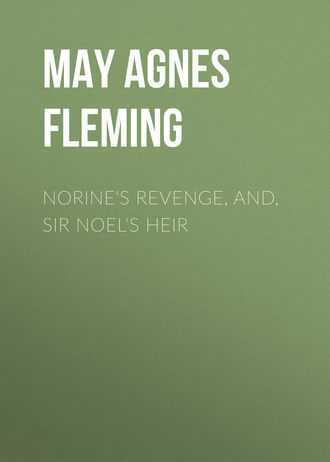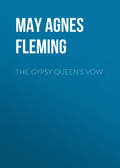
May Agnes Fleming
Norine's Revenge, and, Sir Noel's Heir
CHAPTER XV.
"A FASHIONABLE WEDDING."
Another night had passed, another day had come. At twelve sharp Mr. Liston and a hackney carriage had come for "Mrs. Laurence." Her trunks had been packed by her own-hands. Mr. Liston had settled the claim of the Misses Waddle, and white and still she had come out, shaken hands with the kindly spinsters, entered the hack, fallen back in a corner, her hand shading her eyes, and so was driven away from the Chelsea cottage forever.
"And dead and in her shroud," said the younger Miss Waddle, melo-dramatically, "she will never look more like death than she does to-day."
She had scarcely slept the night through. That pleasant cottage chamber overlooking the sea was haunted for her, full of memories that nearly maddened her to-night. With all her heart she had loved – with all her soul she had trusted. She stood here in the darkness, forsaken, deceived. She hardly knew whether it were passionate love still, or passionate hatred that filled her now. The boundary line between strong love and strong hate is but narrow at the best. A tumult that was agony filled heart and brain. He had never cared for her; never, never! Out of pure revenge upon Richard Gilbert he had mocked her with the farce of love – mocked her from first to last, and wearied of her before one poor week had ended.
"Lightly won, lightly lost," man's motto always, never more true than in her case. Without one pang he had cast her off contemptuously, glad to be rid of her, and had sent his uncle's servant to take her back to the home she had disgraced, the hearts she had broken. She clenched her hands – in the darkness she was walking up and down her room, and hoarse, broken murmurs of a woman scorned and outraged came from her lips. She could picture him even at this hour seated by the side of the girl he was so soon to marry, his arm encircling her, his eyes looking love into hers, his lips murmuring the old false vows, sealing them with the old false caresses. Face downward she flung herself upon the bed at last, wild with the remorse, the despair of her own thoughts.
"Oh," she cried; "I cannot bear it! I cannot, I cannot."
The darkness wrapped her, the deep silence of the night was around her. Up stairs the Misses Waddle slept their vestal beauty sleep, commonplace and content. A month ago she had pitied their dull, loveless, plodding lives. Ah, Heaven! to be free from this torturing pain at her heart, and able to sleep like them now. But even to her sleep came at last, the spent sleep of utter exhaustion.
The morning sun was shining brightly when she awoke. She got up feeling chilled and stiff, worn and grown old. Mechanically she bathed and breakfasted – Miss Waddle the younger gazing askance at her white cheeks and lustreless eyes. Mechanically she returned to her room, and began packing her trunks. And then, this done, she sat with folded hands by the window, looking out upon the sparkling sea, until noon and Mr. Liston should come. Her mind was a blank; the very intensity of the blow benumbed pain. Last night she had lain yonder, and writhed in her torture; to-day she felt almost apathetic – indifferent to past, present, and future. And so, pale and cold, and still, Mr. Liston had found her, so she had shaken hands, and said good-by to the Misses Waddle, and so she had been driven away from her "honeymoon paradise" to begin her life anew.
They reached New York. If Mr. Liston had indeed been the fondest of uncles, he could not have been more affectionately solicitous for the welfare and comfort of his charge. She was indifferent to it all – unconscious of it indeed, looking upon all things with dull, half-sightless eyes.
"Take good care of her, Mrs. Wilkins," he said to his landlady; "she is ailing, as you can see, and don't let her be disturbed or annoyed in my absence. She has had trouble lately, and is not like herself."
It was a shabby-genteel boarding-house, in a shabby-genteel street, close upon East Broadway. At first "Mrs. Liston" had her meals served in her room, and spent her time, for all Mrs. Wilkins could see, in sitting at the window, with idly-lying hands, gazing out into the dull street. Mr. Liston was absent the chief part of the day, and Mrs. Liston steadfastly kept her room; but in the evenings, always closely veiled, Mrs. Wilkins observed he could prevail upon her to go out with him for a walk. He was kind to her, the girl vaguely felt – she would obey him, at least; and, since she could not die and make an end of it all, why, she might as well take a little exercise for her health's sake. He was very good to her, but she felt no gratitude – it was not for her sake, but for the sake of the grudge he owed their mutual foe. Their mutual foe! Did she hate Laurence Thorndyke she wondered. There were times when her very soul grew sick with longing for the sight of his face, the tone of his voice, the touch of his hand, and the sound of his name from Mr. Liston's lips had power to thrill her to the inmost heart still.
Gradually, as the weeks passed, matters changed.
"Time, that blunts the edge of things,
Dries our tears and spoils our bliss,"
was quietly at work for Norine. She came down to the public table, and the pale, spirituelle beauty of the invisible and mysterious Mrs. Liston caused a profound sensation among the boarders. Next, she took to spending the long afternoons in the dingy boarding-house parlor, playing upon the jingling, toneless boarding-house piano such melodies of mournful sweetness that Mrs. Wilkins and her handmaidens of the kitchen paused in their work, to listen, and wonder, and admire.
"That young woman has seen trouble," Mrs. Wilkins said, shaking her head. She had her own opinion – a pretty correct one – of what nature that trouble was; but her beauty and her youth were there to plead for her. She was a lady to her finger-tips, that was evident; and – most potent reason of all with Mrs. Wilkins – Mr. Liston had been her boarder and friend for the past ten years.
So December came.
How the time had gone Norine could hardly have told – it did go somehow, that was all. Trouble, remorse, despair, do not kill; she was still alive and tolerably well, could eat and sleep, play the old tunes, even sometimes sing the old songs. She looked at herself in a sort of dreary wonder in the glass. The face she saw a little paler than of old, was fair and youthful still – the bright hair glossy and abundant as ever. She had read of people whose hair turned gray with trouble; hers had passed and left no sign, only on the lips that had forgotten to smile, the eyes that never lit into gladness or hope, and the heart that lay like lead in her bosom.
The crisp, frosty December days seemed to fly, bringing with them his wedding-day. Every hour now the old agony of that night in the Chelsea cottage came back to stab her through. The seventh of December was the day – could she bear it? – and it was in her power even yet, Mr. Liston told her, to prevent it. Twice during the last fortnight she had seen him, the first time, when, closely veiled, her dress had brushed him on Broadway. He was advancing with another gentleman, both were smoking, both were laughing gayly at some good story Thorndyke seemed to be telling. Handsome, elegant, well-dressed, nonchalant, he passed her, actually turning to glance after the graceful figure and veiled face.
"That figure should belong to a pretty girl," she had heard him say. "Deuce take the veils, what do they wear 'em for. There – there's something oddly familiar about her, too."
She had turned sick and faint, she leaned against a store window for a moment, the busy street going round and round. So they had met and parted again.
The second time it was almost worse. Mr. Liston had taken her to the opera – in her passionate love of music she could forget, for a few brief hours, her pain, when, coming out, in the crush, they had come almost face to face. His bride elect was on his arm, by instinct she knew it, a tall, stylish girl, in sweeping draperies, with blonde hair, blue eyes, and a skin like pearl. He was bending his tall head over her, devotedly; both looked brilliantly handsome and happy.
"For Heaven's sake, come this way!" Liston had cried, and drawn her with him hurriedly in another direction. She had been literally unable to move, standing, white and wild, gazing upon him. Presently came the fateful wedding day. All the night preceding she lay awake, the old tempest of feeling going on within her.
Should she denounce him, or should she not, on his wedding-day? Should she take his bride from him at the very altar, and proclaim him to the world as the liar and betrayer he was, or should she wait? She could not decide. When morning came her mind was in as utter a tumult as ever.
"Have you decided?" Mr. Liston asked her. "Shall Laurence Thorndyke leave his uncle's house to-day, with his bride by his side, or as an outcast and a pauper, scorned by all? It is for you to say."
"I don't know," she answered, hoarsely. "Take me to the church – I will decide there."
He had taken her, led her in, placed her in one of the pews, and left her. His manifold duties kept him with Mr. Darcy; he would be unable to join Norine again that day.
The church filled; an hour before the ceremony it was crowded. Then they came; the bridegroom a trifle pale and nervous, as bridegrooms are wont to be, but, as usual, handsome of face and elegant of attire. Then on her guardian's arm, the bride, a dazzling vision of white satin, Honiton lace, pearl, orange blossoms, gold hair, and tender drooping face. A breathless hush fills the church – in that hush the officiating clergyman came forth – in that hush the bridal party take their places, a flock of white bridesmaids, a group of black gentlemen. And then a voice out of that great stillness speaks.
"If any here know of just cause or impediment why these two should not be joined in the bonds of matrimony, let him speak now, or forever hold his peace."
Mr. Liston turns his quiet face and watchful eyes to one particular pew, to one slender figure and veiled face. The five seconds that follow are as five centuries to the bridegroom. His face is quite white, his gloved fingers are like ice. He glances up at Liston, and then – the ceremony begins. What a horrible time it takes, Laurence Thorndyke thinks; what a horrible ordeal a fashionable public marriage is. Does a dingy hotel parlor rise before him, the rain beating on the windows, and a pale, wistful face look up at him, while a mockery of this solemn rite is being gabbled through by a tipsy actor? Is it the fair, happy, downcast face of his bride he sees or that other face as he saw it last, all white and drawn in the anguish of a last farewell?
"What God hath joined together let no man put asunder!"
It is over. He draws a long, hard breath of relief. Come what may, Helen is his wife.
They rise; they file slowly and gracefully out of the church; the bride hanging on the bridegroom's arm. Closely, very closely, they pass one particular pew wherein a solitary figure stands. She has risen with the rest; she has flung back her veil, and people who glance at her stop involuntarily and look again. The face is like stone, the dark eyes all wild and wide, the lips apart; she stands as if slowly petrifying. But the bridal party do not see her; they pass on, and out.
"Who is she?" strangers whisper. "Has she known Laurence Thorndyke?"
Then they too, go, and all is over.
The wedding party enter their carriages and are whirled away. Mr Liston sees his employer safely off, then returns hurriedly to the church. He is angry with Norine, but it is his duty to look after her, and something in her face to-day has made him afraid. There is nothing to fear, however; she is very quiet now; she sunk down upon her knees, her head has fallen forward upon the rail. He speaks to her; she does not answer. He touches her on the shoulder; she does not look up. He lifts her head – yes, it is as he feared. The edifice is almost deserted now; he takes her in his arms and carries her out into the air. For the second time in her life she has fainted entirely away.
CHAPTER XVI.
"HIS NAME IS LAURENCE THORNDYKE."
A gray March afternoon is blustering itself out in the streets of New York – a slate-colored sky, fast drifting with black, rainy clouds; the wind sobs and shivers in great dusty soughs, and pedestrians bow involuntarily before it, and speed along with winking and watery eyes.
In a quiet, old-fashioned street – for there are quiet, old-fashioned streets even in New York – there stands a big, square, dingy, red brick house, set in a square of grass-grown front garden, a square of brick paving in the rear. Two slim poplars – "old maids of the forest," lift their tall, prim green heads on either side of the heavy hall door. The house looks comfortable, but gloomy, and that is precisely what it is, this dun-colored spring day, comfortable, but gloomy. There are heavy curtains of dark, rich damask draping the windows. Through the clear panes of one of the upper windows you catch the flicker and fall of a red coal fire, and the sombre beauty of a girl's face.
She stands in the large, handsome room, alone, a long, low room, with a carpet of rich, dull crimson velvet, curtains of dull crimson satin damask, papered walls, dull crimson, too. There are oil paintings in gilded frames, ponderous mahogany chairs, tables and footstools; but there is nothing bright in the apartment save the cheerful red fire. It is all dark and oppressive – not even excepting the girl. The pale face that looks gloomily out at the fast drifting sky, at the fast-fading light, is smileless and sober as all the rest. And yet it is a youthful face, a beautiful face, a face that six months ago bloomed with a childish brightness and bloom, the face of Norine Bourdon.
It is close upon four months since she entered this house, as companion, secretary, amanuensis, to Mr. Hugh Darcy. Now she stands here debating within herself whether she shall go to him to-night and tell him she must leave. She shrinks from the task. She has grown strangely old and wise in these four months; she knows something of the world – something of what it must be like to be adrift in New York, friendless and penniless, with only eighteen years and a fair face for one's dangerous dower. Friendless she will be; for in leaving she will deeply irritate Mr. Darcy, deeply anger Mr. Liston, and in all the world, it seems to Norine, there are only those two she can call friends.
And yet – friends! Can she call even them by that name? Mr. Liston is her friend and protector so long as he thinks she will aid him in his vengeance upon his enemy. Mr. Darcy – well, how long will Mr. Darcy be her friend when he discovers how she has imposed upon him? That under a false name and history she has sought the shelter of his roof – she, the cast-off of his nephew? He likes her well – that she knows; he trusts her, respects her – how much liking or respect will remain when he knows her as she is?
"And know he shall," she says, inwardly, her lips compressed. "I cannot carry on this deception longer. For the rest I would have to leave in any case —they return in May, and I cannot, I cannot meet them. Mr. Liston may say what he pleases, it were easier to die than to stay on and meet him again – like that."
She has not forgotten. Such first, passionate love as she gave Laurence Thorndyke is not to be outlived and trampled out in four months; and yet it is much more abhorrence than love that fills her heart with bitterness now.
"The dastard!" she thinks, her black eyes gleaming dangerously; "the coward! How dare he do it! One day or other he shall pay for it, that I swear; but I cannot meet him now. There is nothing for it but to go and tell Mr. Darcy I must leave, and take my chance in the world, quite alone."
She leaned her forehead against the cold, clear glass with a heavy heart-sick sigh. The first keen poignancy of her pain was over, but the dull, deadly sickening ache was there still, and would be for many a day. Hate him she might, long for retaliation she did, but not once could she think of him the happy husband of Helen Holmes without the very heart within her growing faint with deadly jealousy. The sound of his name, the sight of his letters, had power to move her to this day. In the drawing-room below a carefully-painted portrait of the handsome face, the bright blue eyes, the fair, waving hair, hung – a portrait so true, that it was torture only to took at it, and yet how many hours had she not stood before it, her heart full of bitterness – until burning tears filled and blinded her dark impassioned eyes.
Now he and his bride were coming home to this house, and she was expected to stay here and meet them. Expected by Mr. Darcy, who had learned to love her almost as a daughter; expected by Mr. Liston, who had told her she must confront Laurence Thorndyke in this very house, and show him to uncle and wife as he really was – a coward, a liar, a seducer.
"I cannot do it!" she said, her hands clenching together. "I cannot meet him. Mon Dieu, no! not yet – not yet."
She had been introduced into the house just two weeks after the marriage as "my niece from the country – Jane Liston." As Jane Liston she had remained here ever since, winning "golden opinions" from all the household. She had found Mr. Darcy a decrepit, irritable old invalid, bored nearly to death since his ward's wedding – lonely, peevish, sick. He had looked once into the pale, lovely face, and never needed to look again to like her. Trouble and tears had not marred her beauty. A little of the bloom – there never had been much – all of the sparkle, the gay brilliance that had charmed Richard Gilbert were gone; but the eighteen-year-old face was very sweet, very lovely, the dark Canadian eyes, with their unutterable sadness and pathos, wonderfully captivating; and old Hugh Darcy, with a passion for all things fair and young, had become her captive at once.
"You suit me fifty times better than Helen," he said often, drawing the dark loops of shining hair fondly through his old fingers. "Helen was a rattle pate. Never mind – matrimony will tame her down, though the lad's fond of her enough, and will make her a very good sort of husband, I dare say, as husbands go. But you, little woman, with your soft voice – you have a voice like an Æolian harp Jennie, your deft fingers, your apt ways – you are a treasure to a cross old bachelor. You are a nurse born, Jennie, child; how did I ever get along all these years without you?"
He meant it, every word, and a moonlight sort of smile, sweet and grateful, if very sad, thanked him. Once she had lifted his hand to her lips and kissed it, passionate tears filling her eyes.
"I a treasure! Oh, Mr. Darcy! You do not know what you say. I am a wretch – a wretch unworthy of your kindness and trust. But one day I shall tell you all."
He had wondered a little what she meant. "Tell him all!" What could the child have to tell? She was so young – so pathetically young to be widowed – what story lay in her life? The very oldest of all old stories, no doubt – a beloved one lost. He sighed as he thought it, bald-headed, hoary patriarch that he was. He had had his story and his day. The day had ended, the story was read, the book closed and put away, years and years and years ago. In the gallant and golden days of his youth he had met and loved a girl, and been (as he believed, as she told him,) loved in return. He left her to make a home and a competence – he was no millionaire in those far-off days, save in happiness – to return in a year and marry her. Eight months after there came to him his letters, his picture, his ring. A richer knight had entered the lists, and the lady was borne off no unwilling captive. A commonplace, every-day story – nothing new at all.
He took his punishment like a man, in brave silence, and the world went on, and years and riches and honors came, and a man's life was spoiled forever, that was all. As he recalls it, old, white haired, half paralyzed, now in the twilight of seventy odd years, he can remember with curious vividness how brightly the July sun shone down on the hot white pavement of the streets below, the cries of the children at play, the quivering glare of the blazing noontide, as he sat in his office and read the words that renounced him. Twenty-seven years ago, but the picture was engraven on Hugh Darcy's brain, never to be blotted out. Twenty-seven years ago, and when the fortunate rival had fallen in the battle of life, ten years later; when his feeble-souled wife had followed him to the grave, Hugh Darcy's revenge upon her had been to step forward and take the child of that marriage to his heart and home to rear him as his own son, to make his will in his favor, leaving him sole heir to a noble inheritance.
Laurence Thorndyke had sown his wild oats. Well, most young men go in for that kind of agriculture, and the seed sown had not yet begun to crop up. He was happily married, and done for, and for himself Mr. Darcy meant to keep his little "Jennie" with him always, to travel about with her this coming summer, and leave her a handsome portion at his death. "For of course," said Mr. Darcy, "she will forget the husband she has lost, and make some good man happy after I am gone."
He had settled her little romance quite to suit himself. She had crept with her quiet, gentle, womanly ways into his inmost heart – a very kindly heart in spite of life's wear and tear; very kindly, yet with a stubborn sense of justice, and of right and wrong underlying all. Kindly, yet terribly, obstinately, unforgiving to anything like immorality, deception or dishonor.
"I love the child almost better than Helen," he thought sometimes. "I don't want to lose her, and yet I should like to see her safely sheltered under a husband's wing before I go. There's Richard Gilbert now. I've often meant to introduce him to her, but somehow she always slips out of the room and the house when he sends up his card. I wonder if he's got over the loss of that girl last fall. Some men do get over that sort of thing they say. I hope Laurence had nothing to do with it. Gilbert suspected him, I know, but then – 'give a dog a bad name and hang him.' Yes, my little Jennie wouldn't make half a bad wife for Dick Gilbert. I'll introduce him the very next time he comes."
Mr. Darcy sits before his study fire this chill afternoon alone. Liston left some hours ago. It is not yet dinner time, and his companion – where is she? He looks impatiently around – while he took his afternoon nap she has left him. He listens a moment to the wailing voice of the wind, sobbing in a melancholy way about the house, then reaches forth nervously, and rings the bell.
"Send Mrs. Liston here," he says to the servant who answers.
This gray twilight hour is haunted for him, with melancholy flitting faces, dead and gone. He will have Mrs. Liston in to sing and play and exorcise the ghosts. Nobody ever sang Scotch songs or played Scotch melodies half so sweetly, thinks the worn old man, as his little companion.
The door opens and she enters. Her tread, her touch, her garments, are always soft and noiseless. She comes gliding forward in the gloaming, not unlike a ghost herself. Her pale face seems almost startlingly pale in contrast with the black dress she wears. In its whiteness her great dusk eyes look bigger and blacker than ever. It strikes Mr. Darcy.
"Child," he says, "how pale you are. Come over here and let me look at you. You are more like a spirit of the twilight than a young lady of the period."
He draws her affectionately to him, and she sinks on her knees by his chair. There is no light but the dull glow of the fire; he tilts up her chin, and gazes smilingly down into the lovely sombre eyes.
"'Oh, fair, pale Margaret,'" he quotes. "Little one, what is it? You promised to tell me sometime. Why not to-night?"
"Why not to-night?" she repeats. "To-night be it, then. But first, is that a letter on the table?"
"Oh, by-the-by, yes – I nearly forgot all about it. Another letter from our mated turtle doves in Florida. I see by the postmark they are in Florida now. I have kept it for you to read, as usual."
She takes it quite calmly; she knows that big, bold chirography well, and the day comes back to her when Mr. Liston brought to the Chelsea cottage the brief, pitiless note in the same hand – her death warrant. She seats herself on a hassock near the big invalid chair, and by the light of the fire reads Laurence Thorndyke's letter.
It is the gay letter of a happy bridegroom whose bride bends over his shoulder smiling while he writes. He tells of their travels, of how well and handsome Helen is looking; that in another month for certain they will be at home. And with best love and all the kisses he can spare from Nella, he is, as ever, his affectionate nephew, Laurence Thorndyke.
She finished the letter and laid it down.
"Coming home," Mr. Darcy repeats. "Well, I am always glad to see the boy, always fond of Nella. And we will all go to Europe together in May – you to take care of the old man, my dear, and help him laugh at the turtle doves billing and cooing. And in sunny France, in fair Italy, we will see if we cannot bring back roses to these white cheeks."
The dark eyes lift, the grave young voice speaks.
"Thank you," she says. "You are always kind, Mr. Darcy, but I cannot go."
"Jennie! Cannot go?"
"I cannot go Mr. Darcy. I am sorry to leave you, more sorry than I can say, but you must get another attendant and companion. I am going away."
"Mrs. Liston?"
"I am not Mrs. Liston – my name is not Jennie – I am not Mr. Liston's niece. From first to last I have deceived you. I have come to tell you the truth to-night, although it breaks my heart to see you angry. I will tell you the truth, and then you will see that I must go. My name is not Jane Liston. It is Norine Bourdon."
There is a pause. He sits looking at her, astonishment, anger, perplexity, doubt all in his face, and yet he sees that she is telling the truth. And Norine Bourdon – where has he heard that name before? Norine Bourdon! A foreign-sounding and uncommon name, too. Where has he heard it?
"I do not wish you to blame Mr. Liston too much," the quiet voice goes on. "He is to blame, for he suggested the fraud, but I was ready enough to close with it. I had not a friend nor a home in the world that I dared turn to, and I could not face life alone. So I came here under a false name, false in everything, and broke your bread, and took your money, and deceived you. I am not what you think me; I am a girl who has been lured from her home, deceived and cast off. A wicked wretch who fled from her friends, who betrayed a good man's trust, who promised to marry him, and who ran away from him with one who betrayed her in turn. You have heard of me before – heard from Richard Gilbert of Norine Bourdon."
A faint exclamation comes from his lips.
Yes, yes, yes, he sees it all. This is that girl – "Norine Bourdon!" He remembers the odd French name well now.
"I will tell you my story, Mr. Darcy – my wicked and shameful story, and you shall turn me out this very night if you choose. I am the girl your friend, Richard Gilbert, honored with his respect and love; whom he asked in marriage. I loved another man, a younger, handsomer man, but he had left me, forever, I thought, and wearied of my dull country life, sad and disappointed, I accepted him. The man I loved hated Mr. Gilbert. Liston will tell you why, if you ask him. In that hatred he laid a plan of revenge. He cared nothing for me; he was betrothed to a beautiful and wealthy lady; I was but the poor little fool to whom a wise man had given his heart – what became of me did not matter. Three days before my wedding-day he came to me and urged me to fly with him. He loved me, he said; he would make me his wife; he would come for my answer the next night. I must meet him; I must go with him. At night, when they all slept, I stole from the house to meet him; not to fly with him, the good God knows – to refuse him, to forget him, to keep to my duty if my heart broke in the keeping. He had a horse and carriage waiting, and – to this day I hardly know how – he made me enter it, and drove me off. I cried out for help; it was too late; no one heard me. He soothed me with his specious promises, and perhaps I was not difficult to soothe. It was too late to go back; I thought he loved me and went on. He took me to Boston. There, next morning in the hotel, without witnesses, we were married. A man, a clergyman, he told me, came, a ceremony of some sort was gone through, we were pronounced man and wife.
"He took me with him to a cottage he had engaged by the sea shore. For three weeks he remained with me there, tired to death of me, I know now. Then he was summoned to New York to his home, and I was left. Mr. Darcy, he never came back.
"I waited for him weeks and weeks – ah, dear Heaven! what weeks those were. Then the truth was told me. His uncle's servant was in his confidence. I was deserted. I had never been his wife, not for one hour. The man who had come to the hotel was no clergyman; he was going to be married in December; I was to go back to my friends and trouble him no more. That was my fate. I had been betrayed from first to last, and he had done with me forever.
"Well, that is more than six months ago. I don't know whether hearts ever break except in books. I know I am living still, and likely to live. But not here. I have deceived you, Mr. Darcy; but I tell you the truth to-night. And to-night, if you like, I will go."
He rose slowly to his feet; swift, dark passion in his eyes – swift, heavy anger knitting his shaggy brows. He held to the arms of his chair and looked down upon her, his face set hard as iron.
"Sit there!" he ordered. "Tell me the scoundrel's name."







